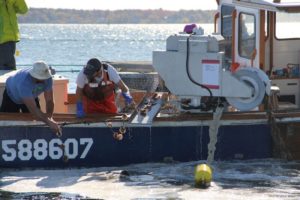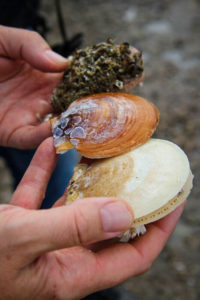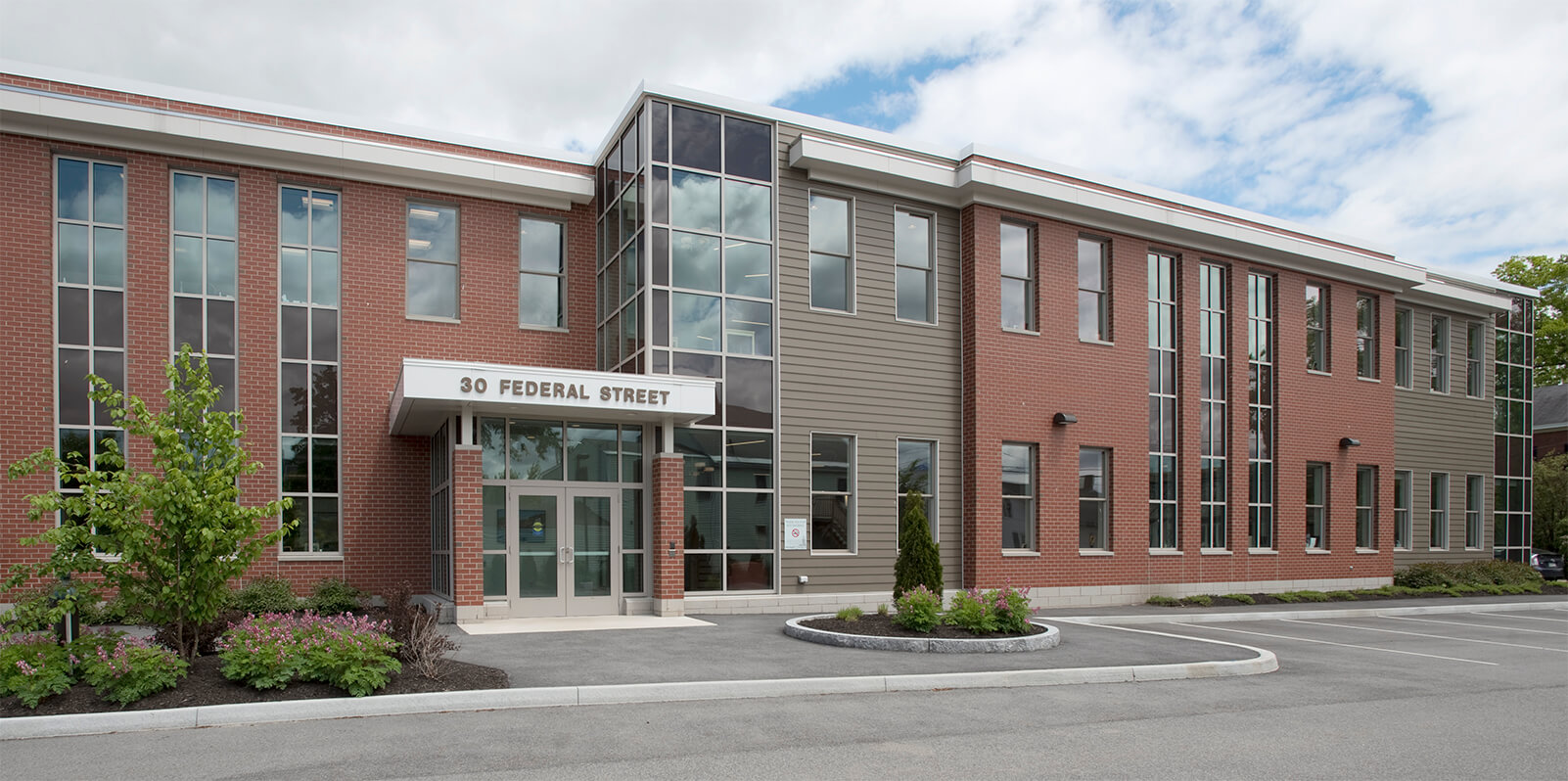April 23, 2018
CEI Leads Project to Introduce Commercially-Viable Scallop Farming in Maine
April 23, 2018 – Brunswick, Maine – Three custom scallop aquaculture machines built in Japan have recently been purchased by CEI as part of a multi-phase initiative to further develop scallop farming efforts in the state of Maine.
The unique, patented equipment is being utilized by Bangs Island Mussel in Portland and Pine Point Oyster in Cape Elizabeth to complete the cycle of raising, harvesting and selling cultivated scallops grown in Maine waters. The scallop grow-out period – from spat (seed) to commercially viable harvest size specimen – is estimated to be between two and three years, depending on the desired size of the final product.
 “Could scallop farming be a sustainable new job-creating industry for Maine? We think so and we’re setting out to prove it,” said Hugh Cowperthwaite, Director, Fisheries Project at CEI. “We are utilizing the ‘Japanese ear-hanging technique,’ with a lens on the economics and profitability. We are tracking equipment costs, shipping and maintenance of the machinery, labor costs, scallop growth rates and selling scallops throughout the value chain.”
“Could scallop farming be a sustainable new job-creating industry for Maine? We think so and we’re setting out to prove it,” said Hugh Cowperthwaite, Director, Fisheries Project at CEI. “We are utilizing the ‘Japanese ear-hanging technique,’ with a lens on the economics and profitability. We are tracking equipment costs, shipping and maintenance of the machinery, labor costs, scallop growth rates and selling scallops throughout the value chain.”
CEI was just awarded a 3-year grant from the Foundation for Food and Agriculture Research (FFAR), a nonprofit established through bipartisan congressional support in the 2014 Farm Bill, to prove the economic viability of farmed scallops. Proof of concept for both the Japanese equipment and grow out techniques would be a significant breakthrough in the American aquaculture industry, legitimizing the Atlantic Sea Scallop as a “new” commercially viable farmed species. This first in the nation project will utilize equipment that has never been used in the United States.
“The Foundation for Food and Agriculture Research is pleased to support this effort to expand economic opportunities and sustainable protein availability in the United States,” said Sally Rockey, Ph.D., executive director of FFAR. “We are optimistic about the potential for this innovative scallop farming equipment combined with market research to spur scallop industry growth, beginning in Maine.”
One of the challenges to farming scallops is that they are mobile. By implementing the ear-hanging technique aquaculturists can literally pin scallop shells to a grow out line which holds them in place. Ear hanging is the process of drilling a small hole in the hinge (ear) of a scallop shell, and inserting a specialized plastic age-pin to attach them to ‘grow out’ lines hung vertically in the water column. Compared to efforts implemented in Maine using bottom cages and trays to grow scallops to maturity, Japanese ear-hung scallops typically show faster growth, experience lower mortality and have a larger meat yields, due to uncrowded growing conditions and access to ample nutrients in the water column.
 This project builds on a more than century-long relationship between Maine and Japan. Maine has been exchanging information and sharing insights into fisheries, energy practices, art, culture and education with its “sister state’ of Aomori Prefecture since 1994, although the origins of the relationship traces back to 1889. That year the 1,500-ton Cheseborough (a Bath, Maine built ship) wrecked off the coast of Aomori during a typhoon. Local citizens from the village of Shariki rescued four survivors and buried those who died, including Captain Peter Erickson. Two Maine groups, the Maine Aomori Sister State Advisory Council and the Friends of Aomori have kept the relationship thriving for over 20 years.
This project builds on a more than century-long relationship between Maine and Japan. Maine has been exchanging information and sharing insights into fisheries, energy practices, art, culture and education with its “sister state’ of Aomori Prefecture since 1994, although the origins of the relationship traces back to 1889. That year the 1,500-ton Cheseborough (a Bath, Maine built ship) wrecked off the coast of Aomori during a typhoon. Local citizens from the village of Shariki rescued four survivors and buried those who died, including Captain Peter Erickson. Two Maine groups, the Maine Aomori Sister State Advisory Council and the Friends of Aomori have kept the relationship thriving for over 20 years.
For the past eight years, CEI has been working in partnership with Maine Sea Grant and the Friends of Aomori to further the development of a Maine scallop farming industry. It was during a visit to Japan in 2010 that Cowperthwaite was introduced to equipment manufacturer Mutsu Kaden Tokki Co. that has been able to mechanize several labor-intensive steps to farming scallops. Principals from Mutsu Kaden Tokki Co. visited Maine in 2011 and 2014 to meet with shellfish growers who were beginning to grow scallops which.
After a year of planning, in October of 2016 CEI led a 10-member delegation to Aomori, Japan for an intensive one-week scallop aquaculture itinerary funded by the United States Japan Foundation. The exchange included a series of meetings with Mutsu Kaden Tokki Co. as well as marine scientists, private businesses, fishing cooperatives and government officials.
Matthew Moretti, President of Bangs Island Mussel of Portland and Nate Perry, Pine Point Oyster Company of Cape Elizabeth were two members on the trip to Japan in 2016. Moretti and Perry have since been working with CEI staff to test the machines in Maine. “I’m excited to be a part of developing a new species for Maine farmers to grow. It’s important that we push the boundaries and work towards diversification” said Moretti.
Perry is no stranger to working with scallops. Over the past 8 years he has been perfecting collection techniques for wild scallop spat (seed) the essential element of scallop farming. “Without the seed, we won’t be able to build an industry” said Perry.
CEI negotiated a trial of the machines conducted in the summer and fall of 2017 and the results were promising. CEI then purchased the three machines with grant support from the Maine Technology Institute. For the three-year research effort, the team will also include Togue Brawn who runs Downeast Dayboat, a business with expertise in buying and selling fresh wild dayboat scallops to consumers across New England. “Maine produces the absolute best scallops in the world, but we’ve failed to differentiate them from generic “scallops”. Cultivated scallops will help differentiate our superior product by providing a year-round supply and by helping consumers understand the factors that yield our superior scallops and unique varietals.” said Brawn.
While many are optimistic about the scallop market opportunities, the research project will also involve the expertise of resource economist Rachel Bouvier of rbouvier consulting. An economic assessment will investigate wild scallop markets when compared to farmed scallops. “It’s important to have a sense of what the market will bear, who will buy the scallops and for what price, as well as interactions with existing fisheries.” said Bouvier.
As harvest and demands increase over time, farmed scallops could create further opportunities within the seafood distribution supply-chain, creating marketplaces not just in Maine but beyond, to Boston, New York, and nationally. “Farmed scallops could be marketed and sold similar to oysters. For starters we could provide the end consumer with the farm name and where they were grown” said Brawn.
About CEI
Coastal Enterprises, Inc. (CEI) helps to grow good jobs, environmentally sustainable enterprises, and shared prosperity in Maine and in rural regions across the country by integrating financing, business and industry expertise, and policy solutions. CEI envisions a world in which communities are economically and environmentally healthy, enabling all people, especially those with low incomes, to reach their full potential. More at www.ceimaine.org



